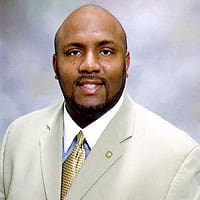
The first full day of testimony in the corruption case against former executives at Schneider Regional Medical Center featured witnesses explaining how employment agreements and payments to hospital workers operate in the government system. Former Division of Personnel Director Kenneth Hermon and former hospital Financial Services Director Eugene Welsh underwent hours of questioning by prosecutors and defense lawyers Thursday.
Defendants Rodney Miller, Peter Najawicz and Amos Carty sat at the defense table in the courtroom of Judge Michael Dunston, a space crowded by lawyers, legal assistants and boxes full of evidence. The prosecution table was equally packed with three V.I. Justice Department lawyers, boxes of documents and case agent Nicholas Peru from the Office of the Inspector General.
When the jury came in Thursday morning Hermon resumed testimony that began on day one of the prosecution’s case. That testimony served to clarify assertions made in opening arguments by defense attorneys Robert King, Gordon Rhea and H. Hannibal O’Bryan. Lawyers for the defendants said they arranged millions of dollars in reimbursements, stipends and perks to themselves and each other because the chief executive officer has the authority to do so.
But the personnel director disagreed. He showed documents that Miller, Najawicz and Carty signed at the start of their employment at the hospital and the Notice of Personnel Action forms that initiated enrollment in the government payroll system. Documents displayed on a screen allowed jurors to see when each of the hospital executives was hired, when they received promotion, additional titles and duties and subsequent raises.
Carty began his employment as general counsel in 1998, at a salary of $80,000. The duties of chief operating officer were added in 2002 with no salary increase and stayed there until November 2007 when Carty succeeded Miller as chief executive officer. The title of hospital president was added, along with a raise in pay to $150,000.
Miller began his employment as chief executive officer in 2003 at a salary of $150,000 plus an annual housing allowance of $20,000. His contract also allowed for two expenses paid trips to attend professional conferences, not to exceed $2,500 per conference. He was allowed to receive up to $500 per year in fees to join professional associations and four weeks compensated vacation time in each contract year.
Najawicz began his service to the medical center as a financial service executive and was later promoted to chief financial officer in 2004, at a salary of $80,000. His notice of personnel action showed an approved salary change to $95,000 in June 2008.
The figures differed sharply from representations made on the first day of the trial when Rhea, representing Carty, said his client was to be compensated at $80,000 according to his personnel notice, but received an additional $109,000 from the hospital.
Attorney King, representing Najawicz, said his client was authorized for an annual salary of $80,000 plus a $20,000 housing allowance. King said the Schneider Hospital Board granted Miller the power to grant raises and perks, so he raised Najawicz’s pay to $175,000.
Prosecutor John Tolud said actions by the three hospital executives amounted to “an illegal taking of money,” including an unexplained $1.8 million payment made directly to Miller’s personal bank account in 2007. There was also a separate payment of $400,000 to Miller that was attributed to a June 2005 work contract later determined to have never existed.
There were also a series of education reimbursements, signing bonuses, stipends and travel expenses funneled into Miller’s bank account that the defense team said were approved as part of his contract with full knowledge of the hospital board.
But Hermon, and later Walsh, explained that authorized payments for hospital employees were processed by the Department of Finance. Those payments, they said, were based on the personnel action documents signed by the defendants and processed for payroll through the Division of Personnel.
Walsh said he had no knowledge about the payment of signing bonuses. Under questioning by Assistant Attorney General Tigrid Tejo-Sprotte, he said he had never heard about educational expense reimbursements.
And when the question of government employees being paid in excess of the amount written down on the personnel action notice was asked, Hermon said the only employees who received extra payments were first responders subject to overtime and covered by union contracts. There may also be times when employees receive cash awards.
Rhea also asked Walsh if Schneider Hospital, as a semi-autonomous agency of the government, could pay its employees extra money from accounts other than the General Fund.
Walsh said there are two funding sources available to the hospital, but he was not aware of any co-mingling of funds.
“The hospital had two sources of funding. One was the General Fund. One was the Hospital Revolving Fund. The NOPA would indicate the funding source. There was no co-mingling that I was aware of. We pay according to what was on the NOPA and what was the funding source, based on NOPA,” he said.





